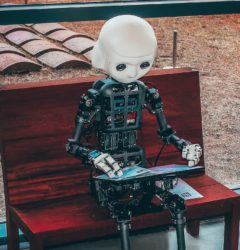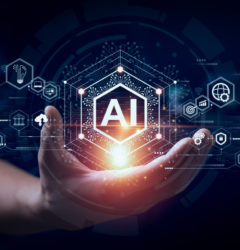05 Apr

Artificial Intelligence – a term that is being floated around in society more and more frequently. The general public became more aware of artificial intelligence (AI) particularly in the last year with the emergence of OpenAI’s ChatGTP language model. However, AI has had a place in business for several years. It has found its way into many industries, and its continued growth is opening up new possibilities for an increasingly diverse range of processes.
Logistics and warehouse management is no exception. It is in this area that artificial intelligence can revolutionise and change the way warehouse operations will be managed.
Automation vs. artificial intelligence
Today, you would be hard pressed to find warehouses that don’t automate at least some of their processes. Scanning RFID codes on goods and automatically linking this data to warehouse software is already a common feature in most businesses.
While automated processes are efficient, they often follow strictly defined patterns and fail to adapt agilely to different conditions over time. This can include, for example, unexpected delays or various errors, which is precisely what artificial intelligence and machine learning can detect and prevent in advance.
Simply put, artificial intelligence can collect lots of data from multiple sources, evaluate it in real time, learn from it and use it to make more informed decisions in the warehouse. This can have a significant impact on reducing costs, increasing productivity and streamlining the entire warehouse management process.
The warehouse: an AI-driven ecosystem
If businesses want to utilise the full potential of AI in warehouses, it’s important to connect all processes and operations into one integrated ecosystem. This integrated approach will allow businesses to monitor and control all warehouse operations in real time. It also gives them the ability to respond to any challenges quickly and efficiently. So what warehouse technologies can artificial intelligence interconnect?

Automated Storage and Retrieval Systems (ARSR)
These autonomous computer-controlled systems, known as ASRS, are used for automated retrieval, handling, storage and delivery of goods in the warehouse. They are able to locate the selected goods at the moment of request and perform the necessary action with perfect precision. With the use of artificial intelligence and ecosystem integration, these systems can work autonomously and spontaneously improve processes.
Automated Guided Vehicle (AGV)
These autonomous vehicles help transport materials and supplies within the warehouse. As the name suggests, they do not need human operators and can thus replace forklift or collection truck operators. With the use of AI, they can increase warehouse productivity, prevent collisions, minimise errors and find effective warehouse management solutions based on the data they collect
Warehouse Management Systems (WMS)
Automated warehouse management systems (WMS) can plan and optimise routes more efficiently with the help of artificial intelligence, but also analyse the performance of operations using AI. This will identify potential problems in the process in real time and improve warehouse planning and management. One of the most important benefits of AI is the ability to forecast demand. By analysing past trends, AI can predict future demand for goods and adjust warehouse capacities accordingly.
Application Performance Management (APM)
In order for such an interconnected ecosystem to function and transfer huge volumes of data internally, it is necessary to monitor the performance of all connected technologies, applications and machines. AI can help identify patterns in the data that would be difficult for a human to detect, and based on that, it can design solutions to optimise application performance. In addition, it can also help by automatically detecting errors and subsequently resolving issues.
Internet of Things (IoT)
The Internet of Things (IoT) plays a very important role in warehouse management. You can visualise IoT as various physical scanners, chips, cameras, sensors etc. that are placed on goods, machines and across necessary locations in the warehouse. Their role is simple – to collect data in real time and forward it to the aforementioned systems so that it can be efficiently utilised.
A competitive advantage in the shape of AI
Warehouse management is a complex mechanism that has been based mainly on information technology for a number of years. Therefore, the integration of artificial intelligence into the whole process must be a perfect symbiosis of all the other systems involved. Thanks to this, businesses can get ahead of the competition and benefit significantly from this transformation. How can artificial intelligence help with warehouse management?
- Real-time monitoring of stock levels and automatic order generation when there is a shortage of materials or goods.
- Decreased storage costs, as it can predict demand more accurately and minimise oversupply or shortages in the warehouse.
- Reducing labour costs or replacing labour altogether, in particular those persons carrying out repetitive manual work in the warehouse.
- Improved productivity and process efficiency by reducing the time it takes to find, select and dispatch goods.
- Data analysis that can reveal areas of the warehouse that can optimise and improve their processes.
- Tracking and anticipating problems in real time, increasing safety and minimising losses.
- Improved planning and coordination processes, enabling better use of resources.
- Optimised quality control and defect detection processes, reducing the number of complaints and increasing customer satisfaction.
- Effective and quick decision-making regarding the most appropriate processes, which can help increase productivity and profitability of the business.
- Optimisation of the route through the warehouse according to real-time calculations and using the nearest possible facility for product picking.
- Prediction of faults in equipment and the monitoring of its performance over time, which can prevent potential problems.
Game-changing AI
Even the biggest players realise that incorporating AI into warehouse management is important for their business.
Amazon: One of the largest e-commerce companies already has its own AI bots. The latest addition is Sparrow, which can independently detect, select and manipulate different products in its inventory.
DHL: This logistics company uses collaborative robots (cobots) to help employees with repetitive tasks such as emptying containers or stacking pallets. Artificial intelligence at DHL also helps with planning and managing inventory flow.
Lineage Logistics: The company specialises in cold storage and refrigerated food storage. Artificial intelligence algorithms process a lot of real-time data, such as energy prices, weather changes, but also the amount of orders over time, from which they can predict when and how to unload cold storage bins and where in the warehouse to place goods, based on whether they are the items most likely to leave the warehouse first.

What are your IT capabilities?
Although it is necessary to stay several steps ahead of your competitors, reduce costs and streamline processes through AI, the implementation process will place a significant burden on your IT structures. At the start, you will need to define your goals and what it will take to achieve them. The next steps involve a key analysis of your current IT solutions as well as the data you are currently collecting. This may include defining a new infrastructure or new ways of collecting data and linking it together into a single ecosystem
If you don’t have sufficient IT capacity for such a transformation, you can extend your IT team for the time needed to complete the entire project. Our IT experts will then be dedicated to your business and this team can be disbanded once the transformation is complete. However, if you want to entrust the entire project into the hands of a reliable partner and not burden your IT team, then custom development is a suitable option for you, whereby we are responsible for the entire project.
If you’d like to talk about the possibilities that AI can bring to your warehouse management, get in touch. We’d be happy to help you and present suitable options during a free, no-obligation consultation with one of our experts.






